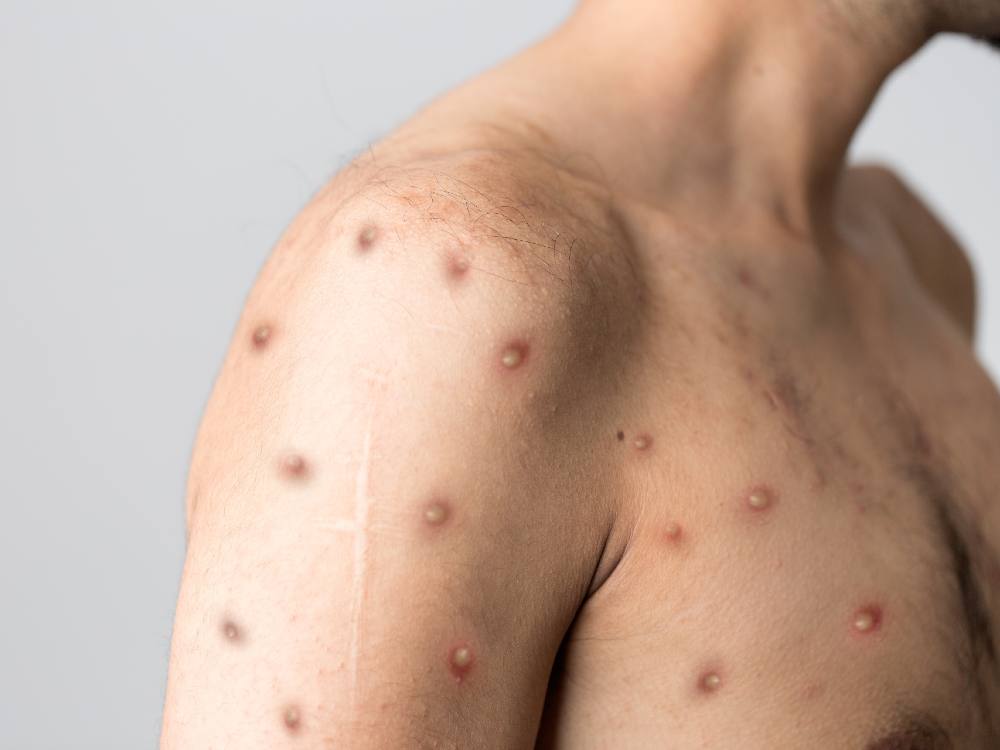British Columbia’s first confirmed monkeypox infection is “an isolated case” and the risk is low, health officials said this week.
Dr. Mark Lysyshyn, deputy chief medical health officer at Vancouver Coastal Health, said the Vancouver resident was a close contact of another person with a confirmed case of monkeypox in Quebec.
Public health is conducting contact tracing and supporting the individual at home.
Canada has confirmed at least 77 cases of the virus, which has broken out in a number of countries where it is not typically seen in recent weeks.
As of Saturday, there were about 780 cases identified in countries outside central and West Africa where it is more common, according to the World Health Organization.
Monkeypox is a disease caused by the monkeypox virus that transmits through close physical contact with sores and lesions, items like bedding, towels and utensils, and respiratory droplets during prolonged, face-to-face contact with someone who is infected.
It is not known to transmit sexually through semen, blood or vaginal discharge, but it can spread through close physical contact during sex.
Symptoms include fever, rash, swollen lymph nodes, open lesions on the genitals and hands and headaches. The symptoms can develop anywhere from five to 21 days after infection, and sores can spread all over the body.
Older people, young babies and people who are immunocompromised are at higher risk for serious symptoms and death.
About three to six per cent of reported cases have resulted in death in endemic countries, according to the World Health Organization. WHO notes this might be an overestimate, as limited testing in those areas mean many non-fatal cases are not identified.
“Most people with this strain of monkeypox actually don't get very sick and, although it takes a few weeks for the rash to resolve, most people get better on their own,” said Lysyshyn.
And the risk of transmission to the general population is low, according to the BC Centre for Disease Control.
“Here in B.C., we don't believe that we have ongoing community transmission. This is an isolated case that's linked to a cluster of cases somewhere else,” he said. “But if people are travelling to locations where monkeypox is happening, we want them to practise safe sex and to monitor for symptoms upon their return.”
It is very unlikely B.C. will see broader public health measures like COVID-19 pandemic protections because monkeypox transmits differently and much less easily than COVID-19, Lysyshyn said.
“There have been case clusters of monkeypox outside endemic countries before, and there tends to be some transmission, but then it settles down, because basically, people are not in physical unprotected contact with many people over and over again,” he said.
The current outbreak has been primarily among men who have sex with men spreading it through close physical contact during sex, he said, which is different from past clusters.
“Presumably, at some point, somebody with monkeypox came to Europe, and then this kind of transmission started happening amongst the community of men who have sex with men,” Lysyshyn said. “And so it seems to be spreading within that social and sexual network.”
Men who have sex with men are typically overrepresented in official disease reporting because they have excellent health seeking behaviours, according to the WHO. As a result of the devastation of the HIV-AIDS epidemic, they are more likely to notice, report and seek treatment for sexually transmitted infections and other communicable diseases.
Lysyshyn encouraged men who have sex with men and their close contacts to practise safer sex and self-monitor for symptoms. “It's not to stigmatize that community, it's just to let people know who are at that heightened risk.”
And if someone believes they have monkeypox, they should isolate themselves from their close contacts and contact public health to get tested.
For the moment, Vancouver Coastal Health is monitoring the situation and conducting contact tracing.
Canada has vaccines available that can protect people who have been exposed against more severe symptoms, which public health will administer to close contacts on a case-by-case basis.
“But if we were to start seeing cases that were spontaneous here in B.C., that had no links to other cases, or to other cases in other locations, that might be more concerning,” said Lysyshyn. “And we would have to change our strategy.”
*Story updated on June 6 at 10 a.m. to clarify information about how monkeypox has spread. ![]()
Read more: Health

















Tyee Commenting Guidelines
Comments that violate guidelines risk being deleted, and violations may result in a temporary or permanent user ban. Maintain the spirit of good conversation to stay in the discussion.
*Please note The Tyee is not a forum for spreading misinformation about COVID-19, denying its existence or minimizing its risk to public health.
Do:
Do not: